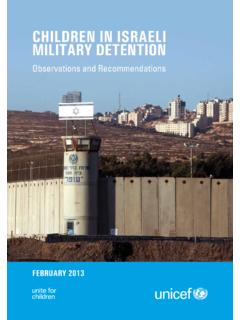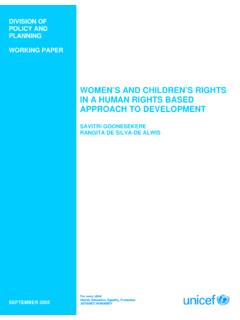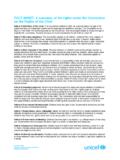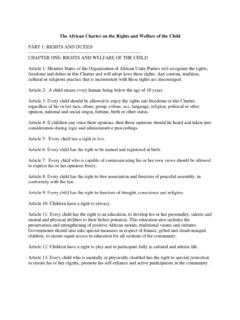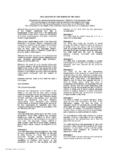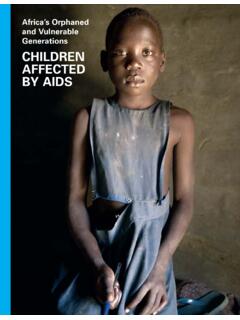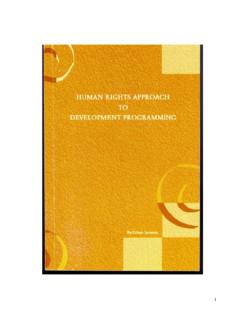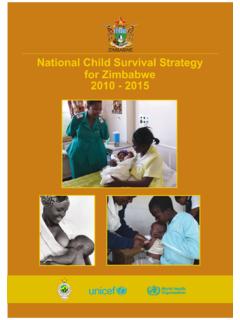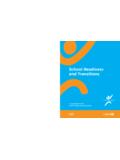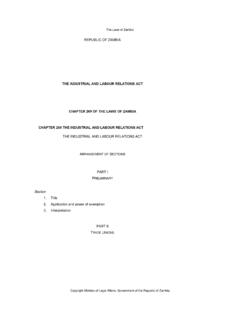Transcription of Zambia NDS Disability and Education 2015 - UNICEF
1 Summary of resultsDISABILITY AND Education Qualitative study from Zambia on barriers to and facilitators of life-long learning2018 QUALITATIVE STUDY FROM Zambia ON BARRIERS TO AND FACILITATORS OF LIFE-LONG LEARNING (SUMMARY OF RESULTS)Central Statistical Office Lusaka, ZambiaMinistry of Community Development and Social Services Lusaka, ZambiaDECEMBER 2018 Professor Jacob Malungo Professor Dabie NabuzokaDr Ravi Paul Mr Nkenda Sachingongu (University of Zambia )Editors:Gloria AzaldeStine Hellum Braathen(SINTEF Digital, Department of Health Research, Norway)SUMMARY OF RESULTS| 1 CONTENTSB ackground to the report 8 Introduction 9 Objectives 11 Research questions 12 Methods 13 Sampling sites and informants 13 Data-collection instruments 13 The field team 14 Data analysis 14 Ethical considerations 15 Description of the sample 16
2 Description of the sites 17 Lusaka Province 17 Copperbelt Province 18 Western Province 21 Eastern Province 22 Summary of results 24 General attitudes to Disability 24 Disability and Education services 26 Quality and relevance of Education 29 Transition to employment and income-generating activities 31 Discussion and recommendations 32 References 36 Appendices: 37 Appendix 1: Tools for data collection 372 | QUALITATIVE STUDY FROM Zambia ON BARRIERS TO AND FACILITATORS OF LIFE-LONG LEARNING LIST OF ABBREVIATIONSCBRC ommunity-Based RehabilitationCHRePCommunity Health Restoration ProgrammeCOIHEPC ommunity Integrated Health Education Programme CRPD(United Nations)
3 Convention on the Rights of Persons with DisabilitiesCSOC entral Statistical OfficeDPOD isabled People s OrganizationEPEastern ProvinceFGD-PWDF ocus Group Discussion with Persons with DisabilitiesILOI nternational Labour OrganisationMCDMCHM inistry of Community Development, Mother and Child HealthMCDSSM inistry of Community Development and Social ServicesNGONon-Governmental OrganisationNVRCN ational Vocational Rehabilitation CentreP TAParent Teacher AssociationRAResearch AssistantTEVETT echnical Education , Vocational and Entrepreneurship TrainingTEVETAT echnical Education , Vocational and Entrepreneurship Training AuthorityUNICEFU nited Nations Children s FundUNZAU niversity of ZambiaUTHU niversity Teaching HospitalZAFODZ ambia Federation of Disability OrganisationsZAPDZ ambia Agency for Persons with DisabilitiesSUMMARY OF RESULTS| 3 ACKNOWLEDGEMENTSThe Research Team would like to thank the Government of the republic of Zambia for conducting the survey through the Ministry of Community Development and Social Services (MCDSS) - then Ministry of Community Development, Mother and Child Health (MCDMCH), Department of Social Welfare - and UNICEF for commissioning the survey.
4 The University of Zambia (UNZA) for hosting this qualitative component of the National Disability Survey (and specifically Department of Psychology, Department of Population Studies, Department of Psychiatry and Department of Gender Studies, who supported the researchers to conduct the study), and SINTEF Digital, Department of Health Research who partnered with UNZA. Other collaborating institutions include Stellenbosch University (South Africa), University of Cape Town (South Africa), University of Melbourne (Australia), Central Statistical Office (CSO), Disabled People s Organisations (DPOs), and Zambia Agency for Persons with Disabilities (ZAPD).
5 We would also like to thank Paul Quarles Van Ufford and Sheila Nkunika who served as our contact persons at UNICEF Zambia during the project period. Their support and guidance was greatly appreciated. We also wish to thank the project s advisory board whose input was most important, and all informants who generously shared their stories and perspectives. Our thanks also to the various institutions and individuals in the four provinces that were covered as indicated below:Holy Cross Skills Training Centre in Western Province; Western Province Association for Disabled People; Ministry of Community Development and Social Service (MCDSS) or then Ministry of Community Development, Mother and Child Health (MCDMCH); and the following individuals: Sarah Banda - Senior Social Welfare Officer; Yengwe Kakusa - Chief Planner; Roselyn Chitambala - Provincial Social Welfare Officer, Western Province; Chris Hilweele - Provincial Social Welfare Officer, Copperbelt Province.
6 Ms Kaleyi Mulemba - Provincial Social Welfare Officer, Eastern Province; Ms Sela Brotherton ( Zambia Federation of Disability Organisations, ZAFOD).In Lusaka Province, we would like to thank the Principal, TEVETA; The Principal, Lusaka School of Vocational Training; In-Charge, Cheshire Homes; Director, ZAPD; Director, Zambia Institute for the Blind; Head Master, Bauleni School; Head Teacher, UTH Special School; Head Teacher, Munali Senior Secondary School; Consultant Psychiatrist, UTH Clinic 6; District Provincial Officer; Principal, Senior Secondary School Eastern Province our thanks go to Mr Patrick Mwanawasa Jr (Provincial Deputy Permanent Secretary); Mr Kalunga Zulu (Chipata District Commissioner); Mr David Lungu (Eastern Centre for Young People with Disabilities).
7 Ms Mutenekwa Inger Lubona ( Zambia Agency for Persons with Disabilities); Mr Chitule Moses Mwale (Deputy Head, Magwero School for the Blind); Ms N. N. Banda (Deputy Head, Magwero School for the Hearing Impaired); Ms Sarah Dippa (Head, Magwero School for the Blind); Mr Chipeta (Head, Magwero School for the Hearing Impaired); Mr Yuyi Mutuna (Magwero School for the Hearing Impaired); Mr Nubert Soko (Magwero School for the Hearing Impaired); Mrs Roserine Muleya (Snr Social Welfare Officer); Ms Jane Sindano (Assistant Social Welfare Officer); Ms Cleopatra Nkole (Assistant Programmes Officer, Social Welfare Department); Ms Miriam Mwale (Principal, Chipata Trades Training Institute).
8 Mr Christopher Zulu (Vice Principal, Chipata Trades Training 4 | QUALITATIVE STUDY FROM Zambia ON BARRIERS TO AND FACILITATORS OF LIFE-LONG LEARNING Institute); Mr Stephen Soko (Project Officer, Chipata CBR Association); Mr Maguya (Director, Chipata CBR Association); Sister Judy Chanda (Chipata Cheshire Home); Ms E. Chilwa (Deputy Head, Hillside School); Ms C Mwanza (Hillside School).Our special thanks to the following Research Assistants who were involved in data collection: Malindi Kaima, Sheila Makungu, Jennis Nabuzoka, Wala Nalungwe, Sepo Lemba, Loveness Chimbala, Susan Ntengwe, Danny Muyaba, Danny Vumbi Likashi and Nelly Malindi. Last, but by no means the least, we wish to thank the following drivers from the University of Zambia who got us around the provinces in what was sometimes difficult terrain: Mr Robert Njovu, Mr Lovemore Malunga and Mr Research TeamUniversity of ZambiaSINTEF Digital, Department of Health Research SUMMARY OF RESULTS| 5 EXECUTIVE SUMMARYThe objective of Component 2 of the National Disability Survey was to carry out a qualitative, in-depth study of the barriers to and facilitators of life-long learning and skills development for children and young persons with disabilities in Zambia .
9 The study was carried out by the University of Zambia (UNZA), in collaboration with SINTEF Digital, Norway. The key findings have been summarised into broad categories with some KNOWLEDGE ON DISABILITYP eople in the various communities studied had a good understanding of what it means to have disabilities and most informants suggested causes that are widely accepted. However, there was also a significant lack of knowledge which may give rise to stigma, fear and social isolation on the part of the community. Such lack of knowledge also affected people s perspective of what persons with disabilities participation in society should entail. The findings indicate that the key to changing this perspective as well as misinformation on the causes of Disability is to provide society, communities, and teachers with Education and information.
10 Since there is a move towards inclusive Education in Zambia , it is important for teacher s Education to include both updated knowledge and an activity-limitations perspective on Disability . Disabled People s Organizations (DPOs) working together with the media or local projects could also try to be more proactive in reaching communities with information. Schools are also good arenas for changing future community OF POLICIEST here are many laws and policies that include persons with disabilities in Zambia , but their implementation is limited. The Disability Act of 2012 ensures full and equal human rights and freedoms to persons with disabilities.
